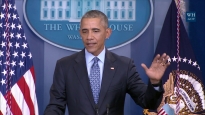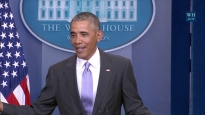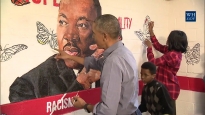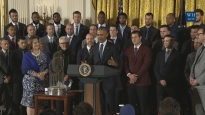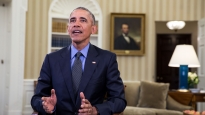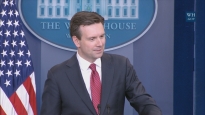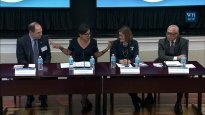President Obama Speaks on the Economy
November 26, 2013 | 25:15 | Public Domain
President Obama delivers remarks on the economy at the DreamWorks Animation facility in Glendale, California. The American motion picture and television industry is a growing industry, and continues to create thousands of jobs across the country.
Remarks by the President on the Economy -- DreamWorks
DreamWorks
Glendale, California
12:50 P.M. PST
THE PRESIDENT: Hello, everybody! (Applause.) Oh, it is good to be in L.A.! (Applause.) It is colder in D.C. at the moment, colder in Chicago, and 70-degree weather is something to be thankful for.
And it is great to be at DreamWorks Animation. I would like to work here. (Laughter.) I have asked Jeffrey. The only concern I had was the lights were kind of dim in the offices and -- (laughter) -- I'm pretty sure I'd fall asleep. But there’s a natural connection between me and DreamWorks. I don't know if you know this, but my ears were one of the inspirations for “Shrek.” (Laughter.) That's true. True story.
Mellody was being very modest when she said she had a front-row seat. Mellody was one of my earliest supporters back when nobody could pronounce my name. And her and John Rogers at Arial Capital helped to co-chair some of my first fundraisers. And they’d have to drag some straggly group in, kicking and screaming, and write a check and listen to this young senator who had a lot of ideas but not necessarily any realistic prospects to win. And she went through a lot of ups and downs with me and my career and is just a great, great friend. So I want to thank her publicly for all the support that she’s given us. (Applause.)
We’ve got some folks here who are fighting for the people of Southern California every single day and I just want to acknowledge them. We've got the Mayor of Glendale, Dave Weaver. (Applause.) We've got three of your outstanding members of Congress -- Brad Sherman, Adam Schiff, Karen Bass. They are all doing a great job. (Applause.)
I want to thank all of you for being here. And I want to thank your CEO, Jeffrey Katzenberg, for inviting me. (Applause.) Jeffrey, like Mellody, has been a friend and a supporter through thick and thin. And I think his place in the entertainment industry is legendary -- I don't need to puff him up too much. (Laughter.) He has a healthy sense of self. (Laughter.) But he is a great friend and somebody whose counsel and advice I value. And I'm incredibly grateful to be here at this wonderful institution that he helped to build.
And I’ve come here today because this is one of America’s economic engines. Not just DreamWorks, but this whole cluster of companies that generations have grown up knowing -- Disney and Warner and Universal and others. When you think about it, what finance is to New York, what the auto industry is to the Midwest, what technology is to Northern California, entertainment is to this part of the country.
And most of us have spent a lot of time thinking about our favorite movies or TV shows, but we don’t often think about the entire infrastructure and industry behind the scenes. Hundreds of thousands of middle-class jobs -- they’re not always on the marquee -- jobs for electricians, and carpenters, and sound mixers, and makeup artists, and designers, and animators depend on this incredible industry here in southern California.
Entertainment is one of America’s biggest exports. And every day, you sell a product that’s made in America to the rest of the world. Every time somebody buys movie tickets, or DVDs, or distribution rights to a film, some of that money goes back to the local economy right here.
And believe it or not, entertainment is part of our American diplomacy. It’s part of what makes us exceptional, part of what makes us such a world power. You can go anywhere on the planet and you’ll see a kid wearing a “Madagascar” T-shirt. (Laughter.) You can say, “May the Force be with you” -- they know what you’re talking about. (Laughter.)
Hundreds of millions of people may never set foot in the United States, but thanks to you, they’ve experienced a small part of what makes our country special. They’ve learned something about our values. We have shaped a world culture through you.
And the stories that we tell transmit values and ideals about tolerance and diversity and overcoming adversity, and creativity that are part of our DNA. And as a consequence of what you’ve done, you helped shape the world’s culture in a way that has made the world better.
They might not know the Gettysburg Address, but if they’re watching some old movie, maybe “Guess Who’s Coming to Dinner,” or “The Mary Tyler Moore Show,” or “Will and Grace” and “Modern Family,” they’ve had a front-row seat to our march towards progress, even if their own nations haven’t made that progress yet. And young people in countries all around the world suddenly make a connection and have an affinity to people who don’t look like them and maybe originally they might have been fearful of, and now suddenly they say, oh, this person is like me -- which is one of the powers of art, but that’s what you transmit.
And that is a remarkable legacy. Now, it’s also a big responsibility. When it comes to issues like gun violence, we’ve got to make sure that we’re not glorifying it, because the stories you tell shape our children’s outlook and their lives. Earlier this year, leaders from this town sat down with Vice President Biden to talk about what Hollywood could do to help keep our kids safe. This was in the wake of Sandy Hook. And those conversations need to continue. The stories we tell matter. And you tell stories more powerfully than anybody else on the Earth.
But I want to make clear, even as we think long and hard about the messages we send, we should never waver from our commitment to the freedom that allows us to tell those stories so well. Protecting our First Amendment rights are vital to who we are. And it’s also good business, because in the global race for jobs and industries, the thing we do better than anybody else is creativity. That’s something that can’t be copied. It’s one of the reasons why even with new markets and new technologies, there’s still no better place to make movies and television and music than right here in the United States.
Entertainment is one of the bright spots of our economy. The gap between what we can do and what other countries can do is enormous.
AUDIENCE MEMBER: Woo!
THE PRESIDENT: Yes, that’s worth cheering for. (Applause.) And that means that we’ve got to do what it takes to make sure that this industry, and every great American industry, keeps that competitive edge so that more folks can find career paths like many of you have, and get good middle-class jobs that allow you to support a family and get ahead.
Nothing is more important than that right now. And as Mellody mentioned, when I came into office, we were going through a severe crisis. Five years later, America has largely fought our way back. We’ve made the tough choices required not just to help the economy recover, but to rebuild it on a new foundation for stronger, more durable economic growth.
We refocused on manufacturing and exports, and today, our businesses sell more goods and services made in this country to the rest of the world than ever before. Our manufacturers are adding jobs for the first time since the 1990s, led by an American auto industry that’s come roaring back. American cars are really good now. (Laughter.)
We decided to reverse our dependence on foreign oil. So today, we generate more renewable energy than ever -- doubled our renewable energy -- more natural gas than anybody. For the first time in nearly 20 years, America now produces more of our own oil than we buy from other countries. It’s good news. (Applause.)
When I took office, America invested far less than countries like China did in wireless infrastructure and we’ve now narrowed that gap, and we have helped companies unleash jobs and innovation and become a booming app economy that’s created hundreds of thousands of jobs. Six years ago, only 5 percent of the world’s smartphones ran on American operating systems. Today, more than 80 percent do. (Applause.)
And, yes, we decided to fix a broken health care system. (Applause.) And it’s interesting -- I was talking to some of the studio execs here, and I said, look, the rollout of the new health care marketplace was rough and nobody was more frustrated about the problems with our website than I am. And yet, here in Southern California and here across this state, there are thousands of people every single day who are getting health care for the first time -- for the first time -- because of this. (Applause.) And, by the way, the website is continually working better, so check it out. (Laughter.)
But as a country, we're now poised to gain health coverage for millions of Americans, starting on January 1st, and that includes more than 350,000 here in California who have already signed up. And thanks in part to the Affordable Care Act, health care costs are growing at the slowest rate in 50 years. Employer-based health care costs are growing at about one-third the rate of a decade ago. And that means that if the studios here or your employers aren't having to spend as much on health care, they can hire more folks and reinvest more in the business, and come up with those cool technologies that -- I don’t exactly understand how they work, but -- (laughter) -- were really neat to look at. (Laughter.)
And, by the way, we've done all this while bringing down our deficits. (Applause.) After years of trillion-dollar deficits, we reined in spending. You would think sometimes listening to folks in Washington that we haven't made any progress on that front. We wound down two wars. We changed a tax code that was too skewed towards the wealthiest Americans at the expense of the middle class. You add it all up, we’ve cut our deficits by more than half, and they continue to go down faster than any time since World War II. (Applause.)
So all told, our businesses created 7.8 million new jobs over the past 44 months. America has gone farther, recovered faster than most other industrialized nations. But, as Mellody said, we've got more work to do. The stock market is doing great, corporate profits soaring, but too many Americans aren’t sharing in that success. And everybody here who works at DreamWorks -- a really good place to work. I'm going to ask Jeff if maybe I can work here. (Applause.) But all of you have friends and family and neighbors who aren't as lucky. And you know there are still a lot of folks who are struggling out there. And my top priority is making sure that this country remains a country where everybody who is willing to work hard can get ahead.
And we'd be a lot further along without some of the dysfunction and obstruction we've seen in Washington. (Applause.) We would be a lot further along if we could just get folks to act with some sense -- (laughter) -- if we didn’t have one wing of one party that was a little less obsessed with repealing health care for 40 million people, more concerned with making sure the law works. If they hadn't spent 40 votes trying to repeal the Affordable Care Act, they might have actually taken some votes on rebuilding our infrastructure, or instituting early childhood education for young people across this country, or investing more money in basic research that helps to create the amazing technologies that many of you utilize. Any of the serious proposals I've put forward that would be creating jobs right now, they could have been taking votes on that.
Instead of rooting for failure, or refighting old battles, Republicans in Congress need to work with us to improve those things about the Affordable Care Act that aren't working as well as they should, and implement policies to strengthen the middle class and create jobs. (Applause.)
A couple of weeks ago, House Republican leaders handed out a piece of paper to their members and on the top it said, “Agenda 2014.” I'm not making this up. Below that, it was blank. (Laughter.) It was a blank sheet of paper -- nothing to create jobs or grow the economy or strengthen the middle class.
And I’ve put forward my plans to create new jobs and even the odds for the middle class. And I’ve put forward plans that gives some Republicans some of the things that they want in exchange for ideas that will create good jobs right now. And so far, they won’t consider them.
Some people have heard me say my list of top five movies -- “The Godfather,” one and two, have to be on it. But it turns out Marlon Brando had it easy, because when it comes to Congress, there’s no such thing as an “offer they can’t refuse.” (Laughter.) I mean, I just keep on coming back. (Laughter.) I'm going to keep on trying, though. (Laughter.) I am, because we've got no choice. (Applause.)
The American people agree with us that jobs, growing the economy should be our number-one priority. And we've got to make some investments to make that happen. And we've got to give a better bargain to the middle class and everybody who is working to join the middle class. And that means building on those cornerstones of what makes for a strong middle class -- good jobs, a good education, a home of your own, health care when you get sick, a secure retirement even if you're not rich. So we can help manufacturers bring more jobs back to America by investing in American clean-energy technology, and putting people to work building roads and bridges and schools and high-speed broadband networks that attract businesses from around the world.
We can prepare our children and our workers for the global competition that they’ll face -- expanding high-quality preschool education, redesigning our high schools, investing in community colleges and job training, and tackling rising college costs, so that young people can afford it. We can help responsible homeowners afford a mortgage or refinancing at today’s low rates, help build a rock-solid housing system for decades to come, instead of boom and bust.
We can bring the promise of a secure retirement back to reach for middle-class families, finding new ways to make it easier for workers to save, and strengthening Social Security, and getting immigration reform done so that undocumented workers are paying their fair share of taxes, but they're not living in the shadows -- (applause) -- and we're attracting the best and the brightest from all around the world.
As I was getting a tour of DreamWorks, I didn't ask, but just looking at faces, I could tell there were some folks who are here not because they were born here, but because they want to be here and they bring extraordinary talents to the United States. And that's part of what makes America special. And that's part of what, by the way, makes California special, because it's always been this magnet of dreamers and strivers. And people coming from every direction saying to themselves, you know, if I work hard there I can have my piece of the American Dream.
We're going to continue to make progress on all those fronts. And, yes, we are going to continue to implement the health care law. The product is good. People want it. And we should not live in a country where people are going bankrupt just because they get sick. And anybody who is going to keep on pushing against that, they will meet my resistance, because I am willing to fix any problems that there are, but I'm not going to abandon people to make sure that they've got health insurance in this country. That is not something we're going to do. (Applause.) And the good news is, as I said, thousands of Californians are already signing up.
I read a really powerful story over the weekend I just want to mention about uninsured folks in Kentucky who are signing up in droves in one of the poorest counties in the country. Some of them can't imagine what having health insurance would be like. And you read these stories and you realize how important it is for folks in Kentucky -- a state, by the way, that did not vote for me -- (laughter) -- and if Kentucky can do it, than every state should be able to do it.
We should be able to expand Medicaid all across the country. There are millions of people who, right now, even under the law, may not get health care that they deserve because their governors have refused to do it just for political reasons -- expanding Medicaid. Fortunately, California, obviously, is not one of them. But this is a fight that we're going to keep fighting, because it's worth fighting. And that's what Mellody referred to.
It's true. I'm not an ideological guy, but there are some things I really believe in. And part of what I believe in is that the essence of this country, what makes this place special, is this idea that Hollywood is glorified and held up, but I actually think it’s true that here, more than anyplace else, no matter what you look like, where you come from, what your last name is, who you love, you should be able to make it if you're willing to work hard. That's what I believe. (Applause.)
And there’s certain values that make that a reality. I have my critics, obviously, but since were here in Hollywood, I want to think about something that the late, great Chicago film critic, Robert [Roger] Ebert said -- and I was fortunate to get to know Roger Ebert and was always inspired by how he handled some really tough stuff. “Kindness,” he wrote, “covers all of my political beliefs.” Kindness covers all of my political beliefs.
And when I think about what I'm fighting for, what gets me up every single day, that captures it just about as much as anything. Kindness; empathy -- that sense that I have a stake in your success; that I'm going to make sure, just because Malia and Sasha are doing well, that's not enough -- I want your kids to do well also. And I'm willing to help to build good schools so that they get a great education, even if mine are already getting a great education.
And I'm going to invest in infrastructure and building things like the Golden Gate Bridge and the Hoover Dam and the Internet -- (laughter) -- because I'm investing for the next generation, not just this one. And that's what binds us together, and that's how we've always moved forward, based on the idea that we have a stake in each other’s success. And that's what drives me. And that's what will continue to drive me.
I believe that every kid should have opportunity. I believe our daughters should have the same opportunities as our sons. I believe that Jeffrey’s kids should be able to aspire to whatever they can dream of, but I also want to make sure that the person who’s cleaning up Jeffrey’s office, that their kid has that same possibility.
And we may have different ideas and different policies on how to do things, but that shouldn’t negate that that core vision is what we're fighting for, and we should be able to sit down together and to keep dreaming and keep working, and to make sure that the American Dream that's been described here in Southern California is sustained for generations to come.
And what’s stopping us is not policy details; it’s not technical issues. It’s to summon the courage to put politics aside once in a while and remember that we've got more in common than our politics would suggest. And as long as I've got the privilege of serving as your President, that's what I'm going to keep on making sure that I do -- to put politics aside once in a while and work on your behalf. (Applause.)
So, thank you, DreamWorks, for what you do. (Applause.) Thank you, Jeffrey, for your hospitality. God bless you. God bless America. (Applause.) Can't wait to see your next movie. (Applause.)
END
1:16 P.M. PST
|
January 18, 2017
|
January 17, 2017
|
January 16, 2017
|
January 16, 2017
|
|
January 14, 2017
|
January 13, 2017
|
January 13, 2017
|
January 12, 2017
|
